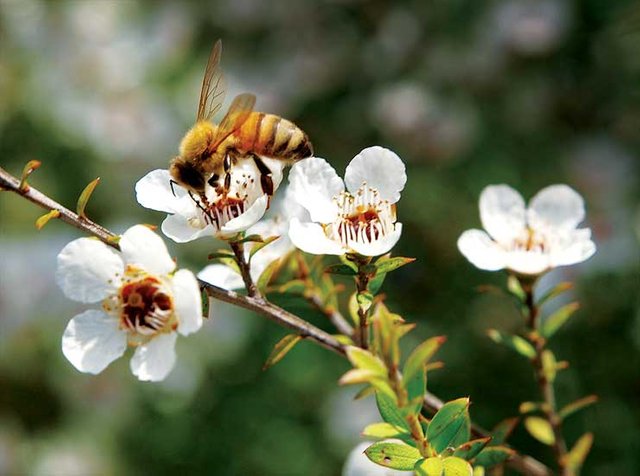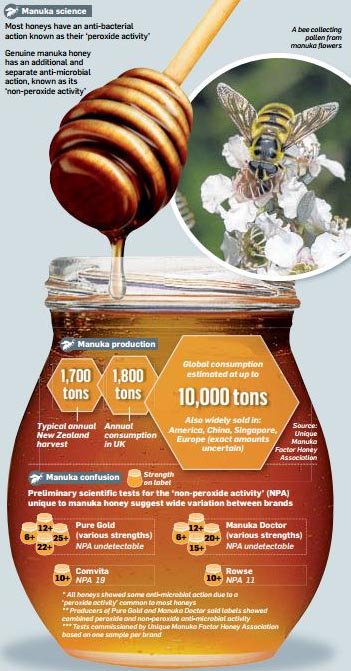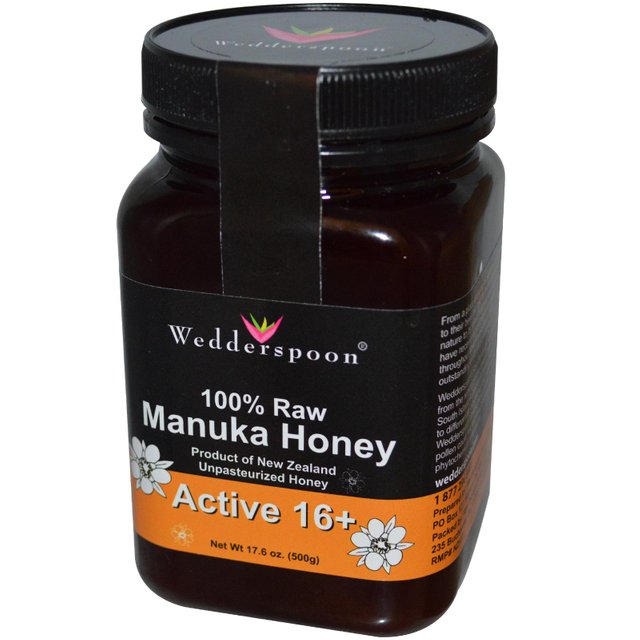The all powerful healer.... MEDICINAL MANUKA HONEY!!!

Through history, honey has played an important role in cultures around the world not only as a food, but also as a medicine! Manuka honey in particular, which is derived from the nectar collected by honey bees that forage the manuka bushes (Leptospermum scoparium) of New Zealand, contains unique antibacterial, antiviral, anti-fungal, anti-inflammatory, antioxidant, antiseptic, stomach-healing, wound-repairing, and overall health-promoting properties that make it an amazing "superfood" worthy of further investigation.
The taste of Manuka is probably an acquired one; the more you eat it, the more you would be able to appreciate its remarkable depth and the unique unforgetable foresty aroma that stands out amongst the honey varieties. Many find mixing a tablespoon of the honey with warm water or tea helpful in treating a sore throat, cough, cold or flu symptoms, and for countering "heatiness" in the body. I love everything about this honey except its price.
Though it has not nearly received the level of attention it truly deserves, manuka honey high in "unique manuka factor" (UMF) is a therapeutic healing food that can be used in a variety of applications both internally and externally. And it is this UMF, which can run as high as 20 percent total content in some higher quality varieties, that makes manuka honey uniquely medicinal.

Another reason why Manuka honey is favored by so many honey fans is that it has a higher than normal conductivity, which is an indirect measurement of mineral content of a honey - about 4 times that of normal flower honeys. UMF is not found in the nectar of all Manuka flowers, which are known as Leptospermum scoparium and belong to the the Tea Tree bushes found in New Zealand's coastal areas. (To be more accurate here, Manuka is also found in Tasmania, but it has been so successfully marketed and branded by New Zealand producers that most people see it an exclusively Kiwi product.) Some Manuka bushes do not produce honey with the UMF property every year, and the concentrations of UMF can vary from batch to batch and year to year. The reason why only some Manuka honeys have the unique UMF antibacterial property is not yet known. Researchers believe that it could be from a subspecies of Manuka or due to some environmental factor such as soil type.
The Waikato Honey Research Unit at the University of Waikato in New Zealand, which first discovered UMF back in the early 1990s, also found that medical manuka honey also contains other non-peroxide, antibacterial components as well. These components, as well as UMF, are uniquely important because they are not broken down by the body's catalase enzyme system in the same way that hydrogen peroxide is, which makes manuka honey far more powerful medicinally than other forms of honey.
Awareness about manuka honey continues to grow, many health food stores, online vendors, and even grocery stores and supermarkets are beginning to carry products claiming to be medical manuka honey. So how can you identify which varieties of manuka honey are truly medicinal and contain high levels of powerful UMF?
If a manuka honey brand does not bear the official logo, be sure to inquire as to who certified their honey for the presence of unique UMF. Always ask for copies of a company's official testing and certification results before purchasing its manuka honey.

Besides its external healing properties, manuka honey is reportedly also effective at treating stomach ulcers, gastritis, and other digestive problems due to both its anti-inflammatory and probiotic characteristics. Its antibiotic, anti-fungal, and antiviral properties also make manuka honey an effective remedy for sore throats, colds, acne, sinusitis, acid reflux and heartburn, ringworm, and many other conditions.
Known to be 20-30x's stronger than the powerful tea tree oil, and treat hundreds of ailments.
UMF-Unique Manuka Factor is the only worldwide standard in identifying and measuring the antibacterial strength or quality of some strains of Manuka. It is a guarantee that the honey being sold has the special UMF antibacterial property and a UMF rating of 10 is the minimum recognized.
Ordinary manuka has only the hydrogen peroxide antibacterial property which is common to most types of honey, whereas UMF Manuka has both the natural hydrogen peroxide antibacterial property and its own natural UMF antibacterial property, giving it increased antibacterial potency. The UMF property is very stable, unlike the hydrogen peroxide antibacterial property common in most honey which is easily destroyed by heat, light as well as certain enzymes in body serum.
Common Uses of Manuka Honey
- Gas
- Stomach ulcers
- Tonsillitis
- Sinusitis
- Skin issues (eczema, rosacea, rashes, and hives)
- Building body immunity
- Facial masks
- Common flu, cold, and coughs
- Cuts and burns
Naturalista

i love honey - have it on most things. I always say to my family how good it is for them -"you never see/hear a bee sneeze'!!.....